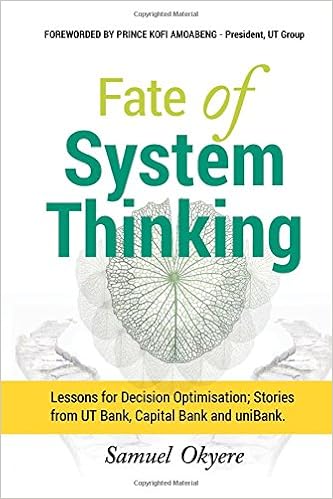The former Managing Director of UT Bank has admitted his outfit lost its vision which partly led to the collapse of the UT Bank.
Prince Kofi Amoabeng in a foreword to a book written by Samuel Otchere, a former UT Bank staff also blamed what he describes as “diverse cultures from different banks” for the challenges that led to the Bank’s collapse.
“The UT family started with one of the strongest corporate cultures based on sound values including respect for all, integrity, professionalism, stepping up to the plate and Ubuntu,” he said in ‘Fate of System Thinking: Lessons for decision optimization – stories from UT, Capital and Unibank’.
UT Bank is one of seven local banks dissolved by the Bank of Ghana (BoG) for various reasons including insolvency.

The Central Bank revoked the license of two commercial banks - UT Bank and Capital Bank in August last year.
There are fresh revelations by BoG detailing what auditors term “willful deceit” on the part of shareholders and directors of defunct UT Banks.
Related: Shareholders, directors of defunct UT, Capital Bank engaged in 'willful deceit' - BoG
A 2014 Bank of Ghana (BoG) Examination and Inspection Report by Boulders and Advisors Limited found that there was a significant amount of inter-group lending within the bank.
This was after a review of two forms of related party transactions; first was loans granted to individuals and companies related to the bank and loans granted to companies connected to one another by ownership and directorship but unrelated to the bank group.
The action was triggered by the inability of the two banks to turn around their negative capital adequacy position which has lingered on for some time now.

Former UT Bank
BoG said the action has been taken against the affected banks due to their “terrible” financial situation and their inability to perform within the banking industry.
Although it is a fact that liquidity crisis and bad loans resulted in the collapse of UT Bank, the former President of UT Group said those were only symptoms of what had gone wrong with the bank.
“The rapid growth and expansion into a bank and the influx of top bankers with diverse cultures, different from that of UT was a major cause of the problem that resulted in high nonperforming loans and liquidity crisis.
“Also contributing to the crisis is the loss of the group’s vision as a result of rapid expansion and growth,” he added.
According to the writer of the book, UT Banks collapse comes down to a failure at heart to appreciate what banking was and is all about.
“There was a problem with the philosophy to provide quick loans instead of being an investment bank or equity firm,” he added.
The book Fate of System Thinking: Lessons for Decision Optimization; Stories from UT Bank, Capital Bank and uniBank, launches tomorrow at the Speaker Hub office in Accra.
Latest Stories
-
Joy FM Prayer Summit for Peace ends in electrifying worship and prayer
5 hours -
The Conscience of Leadership: A call to President Akufo-Addo on Ghana’s environmental devastation
5 hours -
Ghanaian youth unaware of their right to hold politicians accountable – Youth Bridge Foundation
6 hours -
Judge delays Trump sentencing for a third time
7 hours -
2024 WAFCON: Ghana drawn against defending champions South Africa in Group C
7 hours -
Photos from DW-JoyNews street debate on ‘galamsey’
8 hours -
Mimmy Yeboah: Blending heritage with global sophistication, confidence redefined through couture
8 hours -
100 Most Influential People Awards 2024: Brain Hill International School’s Director Mary Anane Awuku honoured
8 hours -
Akufo-Addo commissions 97-km Tema-Mpakadan railway line
9 hours -
Majority requests recall of Parliament
9 hours -
Kanzlsperger and Professor Quartey support WAFA with medical Donation
9 hours -
Gideon Boako donates 10 industrial sewing machines to Yamfo Technical Institute
9 hours -
‘Golden Boy’ Abdul Karim Razak honored at WAFU-B general assembly
9 hours -
Buipewura Jinapor secures Vice Presidential position in National House of Chiefs with record votes
10 hours -
2024 election: I want results to come out like ‘milk and honey’ – Toobu
10 hours

